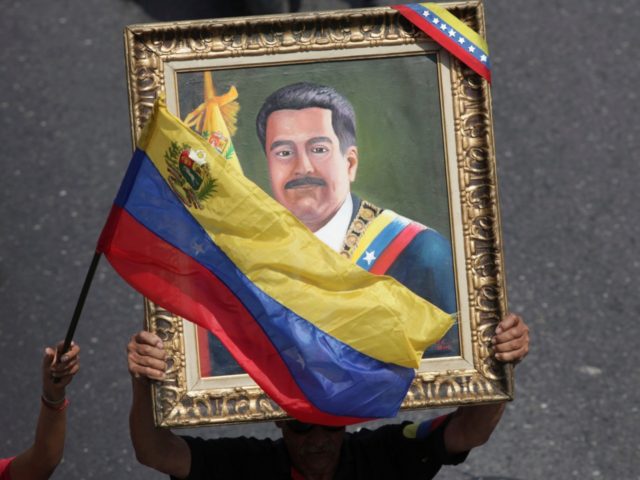The U.S. State Department told Breitbart News in a statement Tuesday the Trump administration believes any talks between Venezuelan dictator Nicolás Maduro and President Juan Guaidó must “include Maduro’s departure as a precondition for elections.”
Guaidó admitted this week that he had agreed to send envoys to Norway to meet with Maduro cronies for “mediation” that he insisted was neither talks or “negotiation.” Norway continues to recognize Maduro as the president of Venezuela despite the expiration of his last term in January, raising concerns about that government’s partiality in the matter.
Many of Venezuela’s opposition leaders reacted to the news with outrage, noting that Maduro has engaged in four other attempts at negotiation with the opposition in the past five years and used them to reinforce their control of the military and kill, imprison, and otherwise repress political dissidents.
The Trump administration has steadfastly supported Guaidó since he was sworn in as president in January. Guaidó’s U.S. ambassador, Carlos Vecchio, recently met with officials at the Pentagon to discuss potential cooperation against Maduro.
Asked if Guaidó choosing to negotiate with the Maduro regime would change his relationship to Washington, the State Department did not indicate that the Norway talks would end this support.
‘The United States has been consistent in supporting efforts to seek a peaceful solution to the Venezuela crisis within the framework of Venezuela’s constitution and democratic processes,” a State Department spokesperson told Breitbart News in response to a query on Tuesday. “We support all efforts to restore democracy and alleviate the suffering of the Venezuelan people and the burden of the crisis on the region.”
“We are not supportive of courses of action that leave corrupt and non-democratic actors in power or buy time for the Maduro regime to further consolidate its hold on the country,” the spokesperson said. “Any discussion of a transition must include Maduro’s departure as a precondition for elections; the increasing repression and attacks against democratic institutions is proof positive that Maduro is unwilling or incapable of respecting democratic processes.”
Guaidó insisted this week that sending a delegation to meet Maduro representatives in Norway was not a capitulation, but necessary as part of a strategy of using every possible course of action to end Maduro’s illegal reign.
“It is an invitation to a mediation by Norway – that is to say, not a negotiation, not a dialogue,” he repeated this week.
A week ago, when news broke of the talks before Guaidó had confirmed them, he said, “There isn’t any sort of negotiation. It is an effort by Norway for a mediation which is months old.”
“We will not lend ourselves to any false negotiations,” he insisted.
“You have reasons to doubt any initiative, and even moreso those of the regime,” Guaidó tweeted on Tuesday in response to the criticism. “But the strategy has not changed, much less the path. We will exercise all options.”
“We have insisted on exercising responsibly all mechanisms to achieve the urgent change that Venezuela requires and construct the necessary capabilities to implement them successfully, taking every step with certainty and always sticking to our path,” he added.
Veterans of the other four rounds of talks with the Maduro regime warned Guaidó to step away from the negotiating table.
“I don’t believe in the good faith of these mafiosos … this is a trap,” Antonio Ledezma, the former mayor of Caracas who was violently taken political prisoner in 2015, told CNN en Español this week.
“Last week, four children died due to lack of medicine … how many more days will we wait to get rid of this regime?” Javier Chirinos of the Vente Venezuela opposition party asked on Venezuelan television. “There is no reason to ask this regime for yet another day.”
Guaidó has cited his deployment of Vecchio to discuss military options with the Pentagon as proof that he has not resigned himself to negotiating with Maduro. Vecchio called the meeting “very positive,” while the U.S. government emphasized that the two discussed the use of the American armed forces to bring humanitarian aid to the South American country.
“The Department of Defense’s role at the moment is to administer humanitarian aid and regional support, as in the past and as in the future,” a spokesperson told the Spanish news service EFE.
Navy Adm. Craig Faller – the head of U.S. Southern Command (Southcom), the wing of the military responsible for Venezuela policy – announced early this month that his command would deploy a hospital ship to the region to help Venezuelan refugees in neighboring countries, as Maduro has repeatedly refused U.S. humanitarian aid and denied the existence of a food and medicine crisis.
“U.S. Southern Command is committed to the region in support of our Caribbean and Latin American partners, as well as displaced Venezuelans who continue to flee the brutal oppression of the former Maduro regime and its interlocking, man-made political, economic and humanitarian crises,” Adm. Faller said in a statement at the time.
Faller has referred to Maduro’s regime as a “mafia” that is “ruining the country” and “compounding every other security problem in our neighborhood.”
The Maduro regime has celebrated the Norway talks as a success.
“I thank the government of Norway for their efforts to advance Peace and stability dialogues for Venezuela,” Maduro said on Twitter on Saturday. “Our delegation leaves for Oslo with a good disposition to work for the integral agenda agreed upon and advance the construction of good accords.”
On Tuesday, Maduro’s Foreign Minister Jorge Arreaza once again lambasted the United States, claiming that Maduro’s government is firmly fighting a “battle against imperialism” from a meeting in Berlin.
“The U.S. wants to retake control of the riches of Venezuela to feed capitalism, to take the gains away,” he alleged.
An overwhelming number of Venezuelans – 87.6 percent of the population – oppose talks between Guaidó and Maduro, according to a Meganálisis firm published in early May.

COMMENTS
Please let us know if you're having issues with commenting.